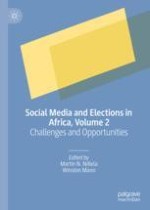2020 | OriginalPaper | Chapter
5. Young People, Social Media, and Political Participation. The Limits of Discursive (In)Civility in the Kenyan Context
Author : Martin N. Ndlela
Published in: Social Media and Elections in Africa, Volume 2
Publisher: Springer International Publishing
Activate our intelligent search to find suitable subject content or patents.
Select sections of text to find matching patents with Artificial Intelligence. powered by
Select sections of text to find additional relevant content using AI-assisted search. powered by
